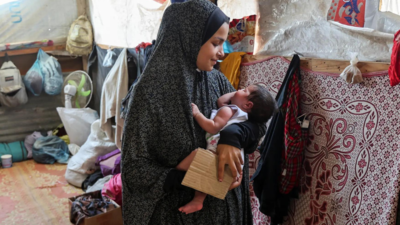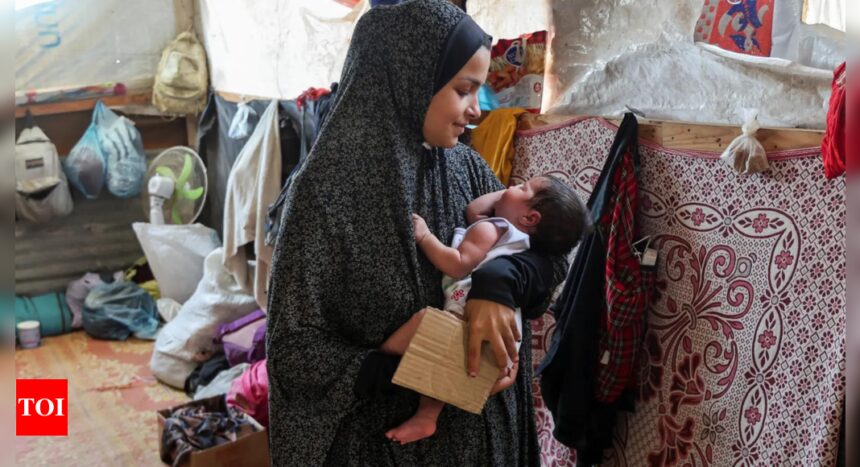[ad_1]

The October 7, 2023, deadly Hamas-led attack which prompted Israel’s devastating counteroffensive in the Gaza Strip, has intensified over the past year, spreading to new fronts. It has resulted in the displacement of 2.3 million Gazans, according to Gaza’s health ministry.
According to Reuters, among the displaced is Rana Salah, a Gazan mother who cradles her one-month-old daughter Milana in a sweltering tent at a camp in Deir al-Balah, central Gaza.She expresses the deep guilt she feels for bringing her child into a world ravaged by war and suffering.
Wouldn’t have gotten pregnant
“If it were up to me, I wouldn’t have gotten pregnant or given birth during the war because life is completely different; we’ve never lived this life before,” she told Reuters.
Reflecting on her past experiences, Rana recalls, “I gave birth twice before, and life was better and easier for me and the child. Now, I feel like I’ve wronged both myself and the child because we deserve to live better than this.”
Milana was born via a cesarean section in a hospital tent, as complications arose during Salah’s pregnancy. The ongoing conflict has prevented the family from returning to their home, forcing them to relocate from one tent to another.
20,000 infants born in Gaza
According to Unicef data, Milana is among the approximately 20,000 infants born in Gaza over the past year. “Instead of returning to our house, we keep moving from one tent to another… where diseases are widespread and the water is contaminated,” Rana said.
The World Health Organization (WHO) has reported a significant decrease in postnatal services in Gaza, limiting access to necessary care for women who have complications and have less access to the care they need, as do their babies.
According to Rick Brennan, the WHO’s Eastern Mediterranean Regional emergency director, newborns face the threat of malnutrition, especially if their mothers are unable to breastfeed due to the lack of access to breast milk substitutes.
He mentioned that constant movement and displacement can be highly disruptive for a newborn, increasing their risk of infection.
How can I carry…
Manar Abu Jarad, who is currently staying in a school shelter run by the UN Palestinian refugee agency (UNRWA), gave birth to her youngest daughter Sahar on September 4th via cesarean section, her husband was killed in the war.
Upon learning that she would require a cesarean for the birth, Abu Jarad was concerned about how she would manage to care for her other children while recovering from the surgery. “I already have three girls. I started shouting… How can I carry (water) buckets? How can I bathe my daughters? How can I help them and my husband is not with me, he was martyred,” Abu told Reuters.
“I’ve reached the point where I cannot carry the responsibility for this girl … Thank God I found some help here,” she said. She has borrowed what she could from family and is forced to use just one diaper a day for the baby, adding that, “I don’t have the money to provide diapers or milk for her.”
Abu yearns for the war to end and hopes to return home, even if it means living in a tent beside what was once her house. “The important thing is to go home. Enough of all the exhaustion we are experiencing here, enough carrying buckets, enough of the dirt in the bathrooms. It’s really, really hard and really tiring for us. Diseases are everywhere,” she added.
Anniversary of the deadly Hamas
As the anniversary of the deadly Hamas-led assault on southern Israel approaches, the nation braces for a tense week marked by both mourning and continued fighting.
With the security situation unstable, shifting restrictions on public gatherings in Israel have cast uncertainty over memorials planned for the victims of the assault, deepening the anguish as the region remains in turmoil.
The current war, a particularly deadly episode in the decades-old Israeli-Palestinian conflict, was triggered on October 7, 2023, when Hamas militants attacked Israel, killing 1,200 people and taking about 250 hostages, according to Israeli tallies.
In response, Israeli air and artillery strikes have reduced much of the Palestinian enclave to rubble, and the Gaza health ministry reports that more than 41,500 Palestinians have lost their lives in the Israeli assault.
[ad_2]
Source link







